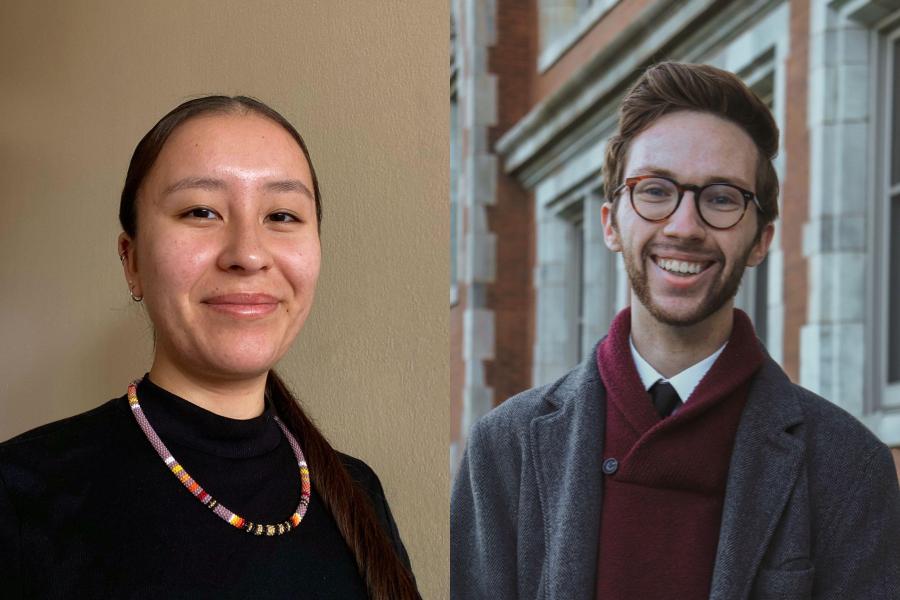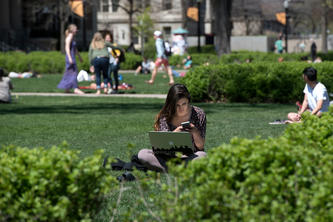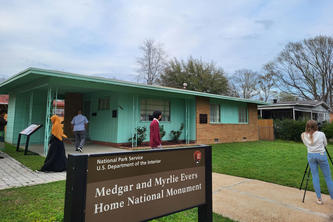
University of Minnesota Twin Cities juniors Carter Yost and Joleece Pecore are among a select group of Truman Scholars—just 62 in the nation—recently announced by the Harry S. Truman Scholarship Foundation. The Truman Scholarship is a prestigious award for undergraduate students who demonstrate a commitment to leadership and public service. This year, the University of Minnesota is one of only two universities in the country to have multiple students selected as Truman Scholars.
Yost is an organizer, speechwriter, political strategist, and triple-major in the College of Liberal Arts who is committed to using storytelling skills to make the world a better place.
Pecore is using art to challenge inaccurate, harmful narratives surrounding Native identity and experiences while being an advocate for Indian Country.
What inspired you to pursue your major(s)?
Joleece Pecore (art and American Indian studies): I knew that I wanted to learn more about American Indian history and how that history shapes contemporary issues for Natives. But art has always been a big part of my life. I don’t consider myself very outspoken or extroverted, so I use my art to advocate for myself. My art is fueled by Native issues and my identity. I see that there are inaccurate representations of Natives and I’m trying to change that narrative.
Carter Yost (communications, political science, and history): I had the benefit of taking a gap year before college, working 80-something hours a week on Pete Buttigieg’s presidential campaign. Because of that, I came into college with a fairly focused sense of what I wanted to do. So I think I was able to think about what kind of academic coursework best complemented that work, and that led me to communications, political science, and history. I think all three of those majors are relevant in quality speechwriting, and all three of those majors are innately connected.
Why did you become interested in public service?
Yost: I was raised in Lincoln, NE, which is this blue dot in an increasingly red state, so most of my life had involved that skillset of trying to work productively on common interests even when you fundamentally disagree on other stuff. That upbringing instilled this core belief that if I had the chance to be doing something that was helpful for other people, it was dumb to not do that.
Pecore: My family has shaped me a lot. My dad is a historian and I have a couple of family members who were a part of the tribal council for the Stockbridge-Munsee Band of Mohicans. My uncle used to be a tribal judge for that nation, and when I really started thinking about what more I could do with my degree, he told me that the best thing I could do for Indian Country is become a lawyer.
Originally, I didn’t really see myself as a lawyer, but over time, I’ve learned that I am capable of being more confident and becoming a leader. Before coming to the U, I wasn’t really involved in a lot, mostly just sports. Through becoming more involved, I’ve found that I was able to feel more confident in myself and bring what I’ve learned into my family and community.
What does a liberal arts education mean to you?
Yost: There are histories of political, economic, racial, and gender injustices that have culminated in generational inequities in … just about everything. To me, a liberal arts education is about explaining and examining how and why we arrived at where we are. And if you don't have that context and that understanding—if you lack a sense of how other communities are impacted or might react—how are you supposed to fix any of the problems we’re facing?
That’s the work I get excited about, trying to bring aboard the people otherwise indifferent to these injustices and content with maintaining the systems that have produced such unfair outcomes. A huge part of that comes from learning and teaching and talking with one another.
Pecore: I’m passionate about Native history and how much it affects today, regarding contemporary Native issues. I don’t think a lot of people understand just how much United States history impacts what’s happening today—how we operate as a society, how we treat one another. So much of our current events are shaped by settler colonialism. For me, it’s important to study our histories so we can better understand and address what’s happening today.
This story was adapted from a College of Liberal Arts interview with Carter Yost and an interview with Joleece Pecore.
- Categories:
- Arts and Humanities
- Social Sciences





